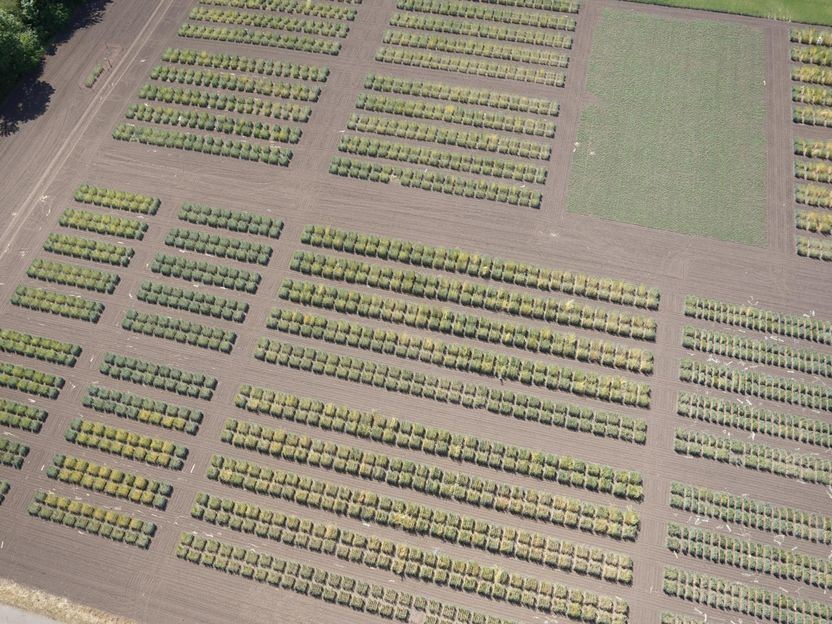New genetic variation from old and exotic varieties for environmentally friendly wheat cultivation.
Gene banks worldwide make an important contribution to the conservation of biological diversity. More than 150,000 varieties are preserved in the Federal Central Ex situ Genebank at the IPK Leibniz Institute alone. In addition to negative traits, many old and exotic varieties also possess valuable gene variants that have been lost in modern varieties but may be crucial for plant production in the future. But how can this treasure trove of biodiversity be tapped for agriculture? This question has been investigated by a research team led by IPK. The results have been published in the journal Nature Genetics.

Experimental field at IPK
IPK Leibniz-Institut | C. Martin
Thanks to sustained funding for the work over six years to date from the German Federal Ministry of Education and Research (BMBF), it was possible to test the IPK Leibniz Institute's extensive collection of old wheat varieties for their yield performance and resistance to yellow rust in the laboratory, as well as in field trials. "This required a logistical tour de force from all project participants and many creative tricks to evaluate the potential of the old varieties without disturbing effects," emphasizes Dr. Albert Schulthess, lead author of the study. To determine the yield potential, for example, the old varieties were paired with adapted elite varieties. Only then did the yield potential of the old varieties become clearly visible.
And that's not all: the researchers used the results to develop bridge lines for wheat breeding from promising old varieties by crossing them with current varieties. The performance of the resulting progeny surprised the researchers: "We observed higher yields in some bridge lines than in important current elite varieties," says Dr. Albert Schulthess, a scientist in the Quantitative Genetics group. Prof. Dr. Jochen Reif, coordinator of the consortium and head of the working group, is convinced that thanks to the involvement of the two breeding companies, the biodiversity of the elite pool can be increased by using new valuable genetic variation of the bridge lines: "This is of great importance to tackle the huge problems that climate change poses for agriculture."
But that's not all. The study's findings provide a major step toward farming with less or no pesticide use. "By comprehensively sequencing old and new varieties, as well as varieties not native to this country, in combination with the valuable field data, we were able to identify possible new gene variants for resistance to yellow rust infestation," says Dr. Albert Schulthess. This would not have been possible without the decoding of the wheat genome, in which the IPK Leibniz Institute played a leading role. "With the new genome regions we discovered in a few old exotic varieties that are not native to this country, we can diversify the immune system of wheat," explains Prof. Dr. Jochen Reif.
However, there are still considerable challenges to be overcome before the new resistance genes can be used in plant production. For example, the resistance genes must be validated and incorporated into the background of elite lines. Ideally, a deeper understanding of the nature of the defense response would be gained at the same time. This would make it possible to exploit the new sources of resistance in the long term. Prof. Dr. Jochen Reif is all the more pleased that the project's application for continuation has been positively reviewed and that funding has been promised for the next three years.
Note: This article has been translated using a computer system without human intervention. LUMITOS offers these automatic translations to present a wider range of current news. Since this article has been translated with automatic translation, it is possible that it contains errors in vocabulary, syntax or grammar. The original article in German can be found here.
Most read news
Topics
Organizations
Other news from the department science

Get the food & beverage industry in your inbox
By submitting this form you agree that LUMITOS AG will send you the newsletter(s) selected above by email. Your data will not be passed on to third parties. Your data will be stored and processed in accordance with our data protection regulations. LUMITOS may contact you by email for the purpose of advertising or market and opinion surveys. You can revoke your consent at any time without giving reasons to LUMITOS AG, Ernst-Augustin-Str. 2, 12489 Berlin, Germany or by e-mail at revoke@lumitos.com with effect for the future. In addition, each email contains a link to unsubscribe from the corresponding newsletter.





























































